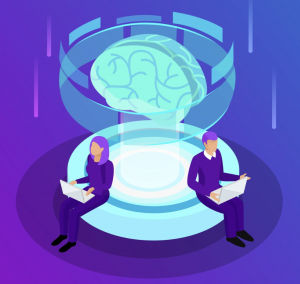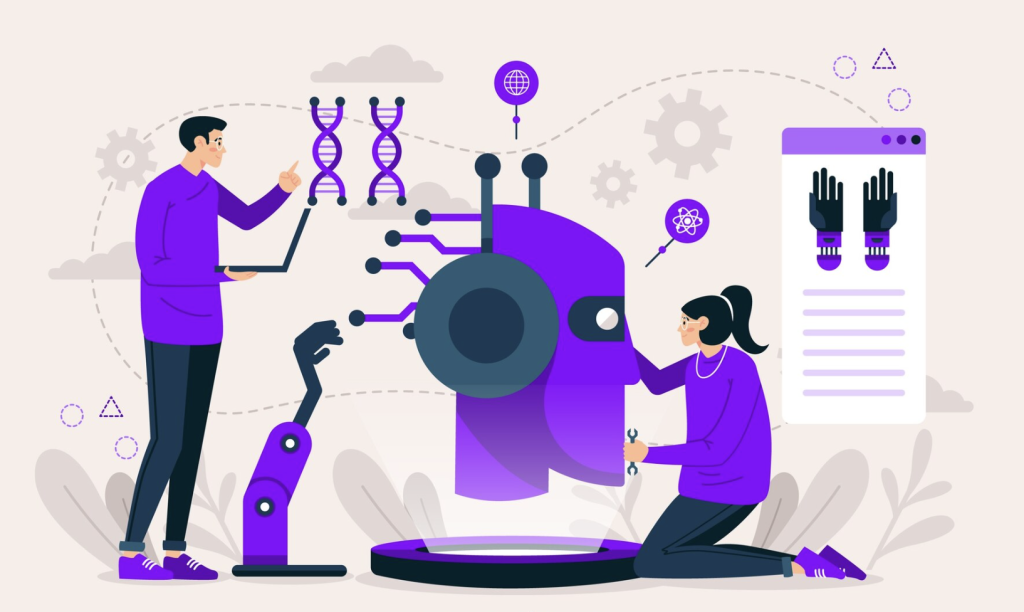Artificial Intelligence is not just a buzzword—it’s a transformative force across all facets of industry. In this blog, we will delve into practical strategies for integrating AI into your business operations. Whether you are looking to enhance customer support, streamline human resources, boost operational efficiency, or revolutionize marketing strategies, AI presents boundless opportunities. By embracing AI, businesses can not only streamline processes but also unlock new avenues for innovation and growth. Let’s explore how AI can elevate various business functions and drive significant improvements in performance and customer satisfaction.
Customer Service
AI technologies in customer service leverage several sophisticated techniques and technologies to enhance user interactions and streamline operations. Here’s how these technologies are applied in practice:
1. Chatbots and Virtual Assistants:
- Natural Language Processing (NLP):
- Machine Learning (ML):
2. Automated Responses and Ticketing:
- Predictive Analysis:
- Task Automation:
3. Voice Recognition and IVR Systems:
- Speech Recognition:
- Emotion Recognition:
4. AI Powered Personalization:
- Data Analysis:
- Dynamic Learning:
5. Predictive Customer Service:
- Trend Analysis:
- Proactive Outreach:
6. Sentiment Analysis:
- Text Analysis:
- Response Adjustment:

Sales and marketing
AI is revolutionizing sales and marketing in real life through sophisticated technologies that enable businesses to analyze customer data, personalize experiences, and optimize operations efficiently. Here’s a closer look at how AI accomplishes these tasks in practical settings:
1. Customer Data Analysis and Segmentation:
- Machine Learning Models:
Artificial Intelligence uses machine learning to digest and analyze vast amounts of customer data quickly, identifying patterns and behaviors that are not obvious to human analysts. For example, AI can predict customer preferences and buying behaviors by analyzing past purchases, browsing history, and social media activity.
- Real-Time Segmentation:
AI algorithms segment customers in real time, enabling marketers to tailor content precisely to different audience segments based on their predicted needs and interests. This is done by dynamically classifying customers into groups as they interact with online platforms.
2. Personalized Customer Experiences:
- Content Personalization:
AI analyzes user interactions on websites and adjusts the content displayed in real time. For instance, if a user shows interest in a specific type of product, AI can immediately highlight similar products or related promotions to increase engagement and likelihood of purchase.
- Recommendation Systems:
Platforms like Netflix and Amazon use Artificial Intelligence to offer personalized recommendations. These systems analyze past interactions to predict what content or products a user might like next, significantly improving the user experience and encouraging continued engagement.
3. Automated Marketing Campaigns with AI:
- Email Campaign Optimization:
AI tools analyze engagement metrics from past email campaigns to determine what content resonates with different segments of the audience. This helps in optimizing subject lines, message content, and sending times to maximize open rates and conversions.
- Programmatic Advertising:
AI is used to buy and place ads automatically based on user behavior. This involves real-time bidding on advertising inventory that matches the advertiser’s criteria, ensuring that ads are shown to the most relevant audience, thus optimizing the advertising spend.
4. Sales Forecasting and Lead Scoring:
- Advanced Forecasting Techniques:
AI models use historical sales data, seasonal trends, and external factors like economic indicators to forecast sales performance. This allows companies to prepare better for future demand and allocate resources more efficiently.
- Lead Prioritization:
Artificial Intelligence evaluates leads based on their activity data and demographic information to score them according to their likelihood to convert. Sales teams can then focus their efforts on the highest-scoring leads, improving their efficiency and success rates.
5. Chatbots for Immediate Customer Interaction:
- Intelligent Chatbots:
These AI-driven chatbots interact with website visitors, providing immediate responses to inquiries, guiding them through the purchasing process, and even resolving basic issues. This interaction is based on a predefined set of information and the ability to learn from ongoing communications.
- Virtual Assistants in Sales:
AI virtual assistants help sales teams by automating routine tasks such as scheduling meetings, sending follow-ups, and managing customer data, allowing sales professionals to focus more on closing deals and less on administrative tasks.
6. Social Media and Sentiment Analysis:
- Automated Monitoring Tools:
AI-powered tools scan social media platforms for mentions and conversations related to a brand, providing real-time alerts and insights about public perception and emerging trends.
- Emotion and Sentiment Detection:
AI analyzes text from social media posts and customer feedback to detect sentiments and emotions, enabling companies to understand customer satisfaction and react proactively to negative experiences.
At Jigya Software Services, we harness Artificial Intelligence to revolutionize sales strategies and customer engagement through real-time data analysis and personalized marketing approaches. Discover more about our innovative solutions at www.jigya.com/services.
Human Resources
Artificial Intelligence has brought significant advancements to the field of Human Resources (HR), enabling more efficient and effective management of various HR functions. Here’s how businesses can employ AI in human resources:
1. AI Powered Recruitment and Talent Acquisition:
- Resume Screening:
AI systems use natural language processing (NLP) to parse and understand the content of resumes. They are programmed to recognize keywords and phrases that match the job qualifications and can rank candidates based on how well their resumes match the job descriptions. This automates the screening process, making it faster and more efficient.
- Candidate Matching:
Machine learning algorithms analyze past hiring data and outcomes to learn what candidate features correlate with successful hires. This model is then used to predict the suitability of new applicants, helping recruiters focus on the most promising candidates.
2. Employee Onboarding:
- Automated Processes:
Artificial Intelligence can manage the administrative aspects of onboarding by auto-filling forms and setting up user accounts, which are tasks that typically require manual input. AI systems can also schedule mandatory training sessions based on the new hire’s role and track completion.
- Personalization:
Based on the employee’s role and previous experiences, AI can suggest personalized resources or additional training modules, enhancing the onboarding experience and accelerating the employee’s readiness for their new role.
3. Performance Management:
- Data-driven Insights:
AI tools collect and analyze performance metrics from various systems like project management tools and performance review platforms. They use this data to provide managers with insights into each employee’s performance trends, strengths, and potential areas for improvement.
- Predictive Analytics:
By analyzing historical performance data, Artificial Intelligence can forecast future performance and identify employees who might be at risk of underperforming, enabling proactive interventions.
4. Employee Engagement and Retention:
- Sentiment Analysis:
AI tools analyze text from employee feedback, surveys, and communication channels to detect sentiments and common themes. This helps HR identify issues related to workplace culture or employee dissatisfaction early.
- Turnover Prediction:
Machine learning models use factors like job role, salary increments, engagement levels, and external job market data to predict the likelihood of an employee leaving the organization, allowing HR to address retention issues proactively.
5. Learning and Development:
- Personalized Learning Paths:
AI analyzes an employee’s current skill set, job requirements, and career progression goals to recommend tailored learning programs. This ensures that the learning and development efforts are aligned with both the employee’s and the organization’s needs.
- Skill Gap Analysis:
Artificial Intelligence can identify skills that are missing from teams and suggest training sessions or hiring strategies to bridge these gaps, thereby ensuring the workforce is capable of meeting future challenges.
6. HR Operations:
- Chatbots for HR Queries:
AI-powered chatbots handle routine inquiries about policies, procedures, and HR processes. They use NLP to understand and respond to employee questions in real-time, providing instant support.
- Workflow Automation:
AI systems are used to automate repetitive tasks such as tracking leave requests, processing expenses, and managing timesheets. This reduces manual labor and speeds up operations.
Leveraging AI for enhanced human resources management is what sets Jigya Software Services apart. From recruitment to employee engagement, our tools streamline HR processes efficiently. Learn more about our HR solutions at www.jigya.com/services.

Supply Chain Management
AI can significantly enhance supply chain management (SCM) by improving efficiency, accuracy, and responsiveness. Here’s how Artificial Intelligence is employed across various aspects of supply chain management:
1. Demand Forecasting using AI:
- Machine Learning Models:
AI uses time series forecasting models to analyze historical sales data along with variables like market trends and seasonal effects. These models can accurately predict future demand, allowing companies to adjust their inventory and production schedules proactively.
2. Inventory Management:
- Optimization Algorithms:
Artificial Intelligence applies complex algorithms to determine the optimal stock levels by analyzing sales velocity, lead time, and variability in demand. This helps in maintaining the right balance of inventory, reducing costs associated with overstocking or stockouts.
3. Warehouse Management:
- Robotics and Automation:
AI-driven robots perform repetitive tasks such as picking, packing, storing, and retrieving items. These robots can navigate through warehouse aisles autonomously, increasing the speed and accuracy of warehouse operations.
- AI-driven Management Systems:
These systems analyze real-time data to manage warehouse operations efficiently, from layout optimization to workforce allocation.
4. Supply Chain Optimization:
- Simulation and Network Analysis:
Artificial Intelligence simulates different supply chain scenarios to identify bottlenecks or inefficiencies. By analyzing the entire supply chain network, AI can suggest improvements in logistics, sourcing, and product lifecycle management.
5. Logistics and Route Optimization:
- Predictive and Real-time Analytics:
AI analyzes traffic data, weather conditions, and vehicle performance to optimize delivery routes in real-time. This not only reduces travel time and fuel consumption but also improves delivery reliability.
6. Supplier Relationship Management:
- Risk Assessment Tools:
AI evaluates suppliers based on various risk factors, including credit scores, performance history, and compliance data. This predictive insight helps companies avoid potential supply disruptions and manage supplier relationships more strategically.
7. Predictive Maintenance:
- Condition Monitoring and Diagnostics:
AI monitors the condition of equipment using sensors that track everything from vibration to temperature. By analyzing this data, AI can predict equipment failures before they occur, allowing for timely maintenance.
8. Risk Management with AI:
- Continuous Monitoring and Response Systems:
AI systems continuously scan for potential risks such as changes in market demand, supply chain disruptions, or geopolitical tensions. They can instantly analyze the potential impact and suggest mitigation strategies, helping companies respond quickly to emerging threats.
AI in Finance and Accounting
Artificial Intelligence is increasingly being integrated into finance and accounting, transforming how businesses manage their finances, optimize their financial operations, and ensure compliance with regulations.
1. Automated Transaction Processing:
- Robotic Process Automation (RPA):
AI-driven RPA tools automate routine and repetitive tasks such as data entry, invoice processing, and reconciliation of transactions. This not only speeds up processes but also reduces human error, ensuring more accurate financial records.
- Smart Data Capture:
AI can extract data from various financial documents like invoices, receipts, and bank statements using optical character recognition (OCR) technology. This data is then automatically classified and entered into accounting systems.
2. Fraud Detection and Risk Management:
- Pattern Recognition:
AI systems analyze transaction data to identify patterns and anomalies that could indicate fraudulent activity. By learning from historical fraud data, these systems can flag unusual transactions in real-time for further investigation.
- Credit Risk Analysis:
AI models assess the creditworthiness of borrowers by analyzing vast amounts of data, including credit scores, payment history, and market conditions, to predict the likelihood of default more accurately than traditional methods.
3. Financial Forecasting and Planning:
- Predictive Analytics:
Artificial Intelligence uses historical financial data and external economic indicators to forecast future financial conditions and performance. This helps businesses in budgeting, financial planning, and capital allocation decisions.
- Scenario Analysis:
Artificial Intelligence can simulate various financial scenarios based on different business decisions or external economic conditions. This helps financial managers make informed decisions by understanding potential impacts on the company’s finances.
4. Regulatory Compliance and Reporting:
- Automated Compliance Checks:
AI systems continuously monitor financial transactions and operations to ensure compliance with relevant laws and regulations. They can automatically generate reports for regulatory purposes, reducing the workload and potential errors from manual compliance tasks.
- Natural Language Processing (NLP):
AI uses NLP to analyze changes in regulatory requirements and adjust the company’s compliance strategies accordingly. It can also help in interpreting complex legal documents and extracting relevant information for compliance purposes.
5. Optimizing Payment Processes:
- Dynamic Discounting:
AI algorithms analyze vendor and payment data to identify opportunities for dynamic discounting, where early payments are made in exchange for discounts. This optimizes cash flow and can save money.
- Payment Optimization:
Artificial Intelligence helps in determining the optimal time to make payments based on cash flow forecasts, helping manage liquidity more effectively.
6. Audit Processes:
- Continuous Auditing:
Artificial Intelligence enables continuous and real-time auditing of financial transactions and records. This allows for ongoing assurance of the financial health and practices of a business, rather than periodic reviews.
- Anomaly Detection:
AI tools scan through vast datasets to identify discrepancies and outliers that may need further investigation, making the audit process more efficient and comprehensive.
Transform your financial operations with AI-driven solutions from Jigya Software Services, where accuracy and compliance are guaranteed. To see how our technologies can streamline your financial processes, visit www.jigya.com/services.
AI Powered Operations
AI integration in operations management is revolutionizing how businesses streamline processes, enhance productivity, and maintain quality across various sectors.
1. Process Optimization:
- Machine Learning Algorithms:
AI can analyze operational data to identify inefficiencies and bottlenecks in processes. By learning from patterns in the data, Artificial Intelligence suggests optimizations that can improve throughput and reduce waste.
- Simulation and Modeling:
Artificial Intelligence can create simulations of production processes to test and compare different operational strategies. This allows companies to optimize their processes before implementing changes in the real world.
2. Predictive Maintenance:
- Sensor Data Analysis:
AI utilizes data from sensors on machinery to predict when equipment will need maintenance. This predictive maintenance approach helps avoid unplanned downtime by scheduling repairs before failures occur.
- Anomaly Detection:
AI systems continuously monitor equipment performance to detect deviations from normal operation, signaling the need for maintenance to prevent potential breakdowns.
3. Quality Control:
- Visual Inspection Systems:
AI-powered visual inspection systems use cameras and image recognition technology to detect defects in products on the production line. These systems can identify issues with higher accuracy and speed than human inspectors.
- Data-Driven Quality Assurance:
AI analyzes data across the entire production process to ensure that all parameters are within quality standards, automatically adjusting processes in real-time to maintain product quality.
4. AI Powered Inventory Management:
- Demand Forecasting:
AI analyzes sales data, market trends, and external factors to accurately forecast demand for products. This helps in maintaining optimal inventory levels, reducing the risk of stockouts or excess inventory.
- Automated Reordering:
AI systems can automate the inventory reordering process, ensuring that supplies and materials are replenished based on predicted needs, thereby optimizing inventory turnover.
5. Supply Chain Coordination:
- Real-time Tracking and Visibility:
Artificial Intelligence provides real-time updates and tracking of goods across the supply chain, enhancing transparency and allowing companies to react quickly to supply chain disruptions.
- Supplier Performance Management:
Artificial Intelligence evaluates supplier reliability and performance by analyzing delivery times, quality metrics, and compliance data to help companies choose and manage suppliers effectively.
6. Energy Management:
- Consumption Optimization:
Artificial Intelligence optimizes energy usage in operations by analyzing patterns of energy consumption and automatically adjusting systems to reduce waste while maintaining operational efficiency.
- Sustainable Operations:
Artificial Intelligence can help companies reduce their carbon footprint by optimizing resource utilization and energy consumption, supporting sustainability goals.
Streamline your operations with AI innovations from Jigya Software Services. Our smart solutions enhance productivity and maintain quality across various sectors. Dive into our operational technologies at www.jigya.com/services.

AI in Healthcare
AI is profoundly transforming the healthcare sector, offering new capabilities for diagnosis, treatment, patient care, and system management.
1. Diagnostics and Imaging:
- Image Analysis:
AI algorithms, particularly deep learning, are used to analyze medical images such as X-rays, MRIs, and CT scans. These AI systems can detect abnormalities, such as tumors or fractures, often with equal or greater accuracy than human radiologists.
- Predictive Diagnostics:
Artificial Intelligence can predict diseases by identifying subtle patterns in the patient data that may be overlooked by human observers. For example, AI systems are being used to predict the onset of diseases like diabetes or heart attacks earlier than traditional methods.
2. Personalized Medicine:
- Genomic Medicine:
Artificial Intelligence analyzes genetic information to help predict how individuals will respond to certain treatments, enabling personalized treatment plans that are optimized for each patient’s unique genetic makeup.
- Drug Response:
AI models predict patients’ responses to different drugs, reducing the trial and error process in finding the most effective medication for individual patients.
3. Patient Monitoring and Care:
- Remote Monitoring:
AI-powered devices and apps can monitor patient health in real-time and alert healthcare providers if a patient’s condition deteriorates. This is particularly valuable for managing chronic conditions like heart disease or diabetes.
- Virtual Health Assistants:
AI-driven virtual assistants can provide constant health guidance and support to patients, reminding them to take their medication, adhere to prescribed diets, or follow rehabilitation exercises.
4. Clinical Decision Support:
- Treatment Recommendations:
AI systems analyze medical literature, clinical studies, and patient records to provide evidence-based treatment recommendations to physicians.
- Risk Assessment Tools:
AI tools assess patients’ risk of developing certain conditions, enabling preventive measures or more focused monitoring.
5. Operational Efficiency using AI:
- Hospital Workflow Management:
Artificial Intelligence optimizes hospital workflows, from scheduling staff and managing bed occupancy to streamlining patient admissions and discharges. This improves efficiency and reduces patient waiting times.
- Supply Chain Management:
AI forecasts the demand for medical supplies and medications, improving inventory management and reducing waste.
6. Epidemiology and Public Health:
- Disease Surveillance:
AI systems analyze data from multiple sources to track disease outbreaks in real-time. This helps public health officials make quicker decisions during health crises.
- Predictive Modeling:
Artificial Intelligence models predict the spread of diseases and the impact of public health interventions, aiding in pandemic response and planning.

Research and Development with AI
Here’s how Artificial Intelligence is increasingly being integrated into R&D processes across various industries:
1. Enhancing Innovation:
- Predictive Analytics:
AI analyzes historical data and emerging trends to predict future technological advancements and market needs. This helps R&D teams in developing products that are likely to meet future demand.
- Simulation and Modeling:
AI-driven simulations model how new products will perform under various conditions without the need to physically create and test each version. This not only speeds up the R&D process but also reduces costs significantly.
2. Optimizing Product Development:
- Material Science:
AI tools accelerate the discovery of new materials by predicting the properties of potential materials based on their chemical compositions. This is particularly useful in industries like pharmaceuticals and electronics.
- Automated Design:
AI algorithms can generate product designs or improve existing designs by optimizing for various factors such as durability, cost, and performance. These tools allow for rapid prototyping and iterative testing.
3. Streamlining Testing and Validation:
- Automated Testing:
Artificial Intelligence can automate the testing of software and hardware products, quickly identifying defects or areas for improvement. This automation extends to quality control processes, ensuring that products meet the required standards.
- Real-time Data Analysis:
During product testing, AI can analyze data in real time to provide immediate insights into how a product is performing, which can significantly shorten the R&D cycle.
4. Collaborative R&D:
- Knowledge Management:
Artificial Intelligence helps in organizing and retrieving vast amounts of research data, previous project outcomes, and expert knowledge. This enables more efficient collaboration both within an organization and with external partners.
- Intellectual Property Management:
Artificial Intelligence tools assist in scanning vast databases to check for potential patent infringements or to identify opportunities for new patents, protecting innovations and aiding in strategic patent filing.
5. Cost Reduction and Efficiency with AI:
- Resource Optimization:
AI analyzes R&D processes to identify inefficiencies and suggests improvements, optimizing resource allocation and reducing wastage.
- Predictive Maintenance for R&D Equipment:
AI predicts when R&D equipment needs maintenance, thereby minimizing downtime and extending the lifespan of costly equipment.
6. Enhanced Decision-Making:
- Scenario Analysis:
AI can simulate different R&D strategies to predict their outcomes, helping decision-makers choose the most effective paths for product development.
- Market Analysis:
AI tools integrate market data analysis to guide R&D directions based on competitive analysis and consumer behavior insights.
Integrating AI into your business is not just about adopting new technology—it’s about transforming operational processes and enhancing decision-making to stay ahead in today’s competitive landscape. By strategically deploying AI, businesses can unlock new efficiencies, foster innovation, and deliver exceptional value to customers. Embrace AI integration as a cornerstone of your business strategy to drive growth and sustainability.


